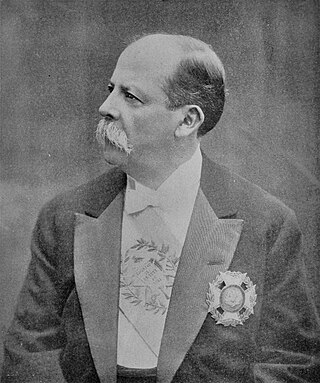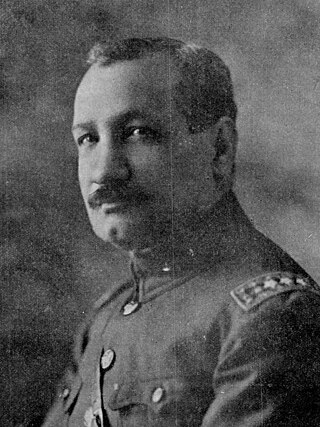
Manuel José Estrada Cabrera was the President of Guatemala from 1898 to 1920. A lawyer with no military background, he modernised the country's industry and transportation infrastructure, via granting concessions to the American-owned United Fruit Company, whose influence on the government was deeply unpopular among the population. Estrada Cabrera ruled as a dictator who used increasingly brutal methods to assert his authority, including armed strike-breaking, and he effectively controlled general elections. He retained power for 22 years through controlled elections in 1904, 1910, and 1916, and was eventually removed from office when the national assembly declared him mentally incompetent, and he was jailed for corruption. As such, he was the longest-serving leader of Guatemala. Son of Pedro Estrada-Monzón and Joaquina Cabrera.

José María Reina Andrade was the acting President of Guatemala from 2 January 1931 to 14 February 1931.

José María Orellana Pinto was a Guatemalan political and military leader. He was chief of staff of President Manuel Estrada Cabrera and President of Guatemala between 1921 and 1926, after overthrowing Conservative Unionist President Carlos Herrera. During his rule the Quetzal was established as the currency of Guatemala. Orellana Pinto died under suspicious circumstances in 1926 at the age of fifty-four. He was buried in the Guatemalan capital with state honors.

Carlos Herrera y Luna was a Guatemalan politician who served as acting President of Guatemala from 30 March 1920 to 15 September 1920, and President of Guatemala from 16 September 1920 until 10 December 1921.
Parliamentary elections were held in Guatemala between 24 and 26 January 1947 in order to elect half the seats in Congress. The Revolutionary Action Party won a plurality of seats.
Presidential elections were held in Guatemala between 17 and 19 December 1944. The October Revolution had overthrown Jorge Ubico, the American-backed dictator, after which a junta composed of Francisco Javier Arana, Jacobo Árbenz and Jorge Toriello took power, and quickly announced presidential elections, as well as elections for a constitutional assembly. The subsequent elections were broadly considered free and fair, although only literate men were given the vote. Unlike in similar historical situations, none of the junta members stood for election. The front-runner was the university professor Juan José Arévalo, nominated by the National Renovation Party. His closest challenger was Adrián Recinos, whose campaign included a number of individuals identified with the Ubico regime. The ballots were tallied on 19 December and Arévalo won in a landslide with 86.25% of the vote, receiving more than four times as many votes as the other candidates combined. The Constitutional Assembly elections took place on 28–30 December, with the United Front of Arevalist Parties winning 50 of the 65 seats.
General elections were held in Guatemala between 6 and 8 February 1931. In the presidential election Jorge Ubico was elected unopposed, after the remaining sector of the old Liberal Party did not object to his candidacy, whilst the Conservative Party was too disorganised and discredited from the Lázaro Chacón González era to put forward a candidate. Ubico's Progressive Liberal Party, formed by a union of the two wings of the divided Liberal Party also won the parliamentary election unopposed.

Presidential elections were held in Guatemala during seven days in September 1898. Prior to the elections Manuel Estrada Cabrera had established the first real political party in the country's history by admitting people from outside the influential liberals to the Liberal Party.
Presidential elections were held in Guatemala on 11 April 1910. Manuel Estrada Cabrera was re-elected unopposed. His new term started on 15 March 1911.
Presidential elections were held in Guatemala on 17 January 1916. For the second successive election, Manuel Estrada Cabrera was re-elected unopposed. Despite there only being one candidate, voters were rounded up by the military and taken to polling stations, where they could only vote for Cabrera. Cabrera assumed the presidency on 15 March 1911.
Indirect presidential elections were held in Guatemala on 8 April 1920. After two decades of repression and dictatorial rule, political opponents of Manuel Estrada Cabrera organized the Unionist Party (PU) in 1919. Led by Conservatives tied to the landed oligarchy, the Unionists also attracted support among the urban proletariat, artisans, students, and industrialists.
General elections were held in Honduras on 28 March 1971. Voters went to the polls to elect a new President of the Republic and a new Congress. The two main parties, the National Party and Liberal Party, had agreed before the election to split the Congressional seats equally between them, with each party being awarded 32 of the 64 seats. Additional one seat was to be allocated to the winner of the presidential elections as the president was entitled to one seat in parliament, while both parties were to be equally represented in the Supreme Court in all state institutions including the Government. Ramón Ernesto Cruz Uclés of the National Party won the presidential election with 53% of the vote. Approximately 40% out of total of around 900,000 voters abstained from voting at the elections. Some of the major topics at the elections was the issue of commitment to continued participation in the Central American Common Market and approach to the relations with El Salvador after the Football War.

Constituent Assembly elections were held in Honduras on 12 February 1965. The Constituent Assembly subsequently elected Oswaldo López Arellano as president.

General elections were held in Honduras on 10 October 1948. The elections were boycotted by the Liberal Party as the party was restricted from campaigning. Instead, they called for the electorate to abstain from voting.

Antonio Macías del Real (1866–1939) was a Spanish writer and pharmacist who moved to Guatemala where he wrote for most prestigious cultural publications. Among his articles are those that we wrote for La Ilustración Guatemalteca during the last year of general José María Reina Barrios presidency. When the president was assassinated on 8 February 1898, Macías del Real wrote Perfiles biográficos de don Manuel Estrada Cabrera (Biographical profiles of Mr. Manuel Estrada Cabrera, who had been appointed as interim President; Macias del Real kept writing on behalf of the new president since then. In 1902 his adulation paid off, as Estrada Cabrera granted him the Pacific Railroad concession. According to Guatemalan historian Rafael Arévalo Martínez in his book ¡Ecce Pericles!, Macías del Real -a pharmacist graduated from Universidad Central de Madrid and later incorporated in Guatemala- was the one that gave Estrada Cabrera a potent venom that the latter used to get rid of his opponents.

Luz Méndez de la Vega was a Guatemalan feminist writer, journalist, poet, academic and actress. As an academic, she concentrated on researching and rescuing the work of colonial Guatemalan women writers. She was the winner of Guatemala's highest prize for literature, Miguel Ángel Asturias National Literature Prize, and the Chilean Pablo Neruda Medal, among many other literary awards throughout her career.
Presidential elections were held in Guatemala in November 1873. The result was a victory for Justo Rufino Barrios.

Presidential elections were held in Guatemala in November 1880.
Presidential elections were held in Guatemala in January 1892. The result was a victory for José María Reina Barrios.
Anarchism in Guatemala emerged from the country's labor movement in the late 19th century. Anarcho-syndicalism rose to prominence in the early 20th century, reaching its peak during the 1920s, before being suppressed by the right-wing dictatorship of Jorge Ubico.











